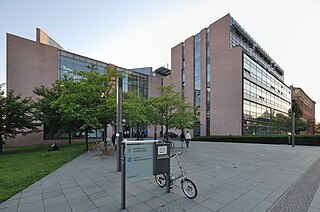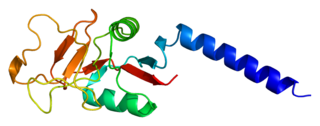
The immune system is a network of biological systems that protects an organism from diseases. It detects and responds to a wide variety of pathogens, from viruses to parasitic worms, as well as cancer cells and objects such as wood splinters, distinguishing them from the organism's own healthy tissue. Many species have two major subsystems of the immune system. The innate immune system provides a preconfigured response to broad groups of situations and stimuli. The adaptive immune system provides a tailored response to each stimulus by learning to recognize molecules it has previously encountered. Both use molecules and cells to perform their functions.
In biology, immunity is the state of being insusceptible or resistant to a noxious agent or process, especially a pathogen or infectious disease. Immunity may occur naturally or be produced by prior exposure or immunization.
Immunodeficiency, also known as immunocompromisation, is a state in which the immune system's ability to fight infectious diseases and cancer is compromised or entirely absent. Most cases are acquired ("secondary") due to extrinsic factors that affect the patient's immune system. Examples of these extrinsic factors include HIV infection and environmental factors, such as nutrition. Immunocompromisation may also be due to genetic diseases/flaws such as SCID.

DC-SIGN also known as CD209 is a protein which in humans is encoded by the CD209 gene.

The Max Planck Institute for Infection Biology (MPIIB) is a non-university research institute of the Max Planck Society located in the heart of Berlin in Berlin-Mitte. It was founded in 1993. Arturo Zychlinsky is currently the Managing Director. The MPIIB is divided into nine research groups, two partner groups and two Emeritus Groups of the founding director Stefan H. E. Kaufmann and the director emeritus Thomas F. Meyer. The department "Regulation in Infection Biology" headed by 2020 Nobel laureate Emmanuelle Charpentier was hived off as an independent research center in May 2018. The Max Planck Unit for the Science of Pathogens is now administratively independent of the Max Planck Institute for Infection Biology. In October 2019, Igor Iatsenko and Matthieu Domenech de Cellès established their research groups at the institute, Mark Cronan started his position as research group leader in March 2020. Silvia Portugal joined the institute in June 2020 as Lise Meitner Group Leader. Two more research groups where added in 2020, Felix M. Key joined in September and Olivia Majer in October, completing the reorganization of the Max Planck Institute for Infection Biology. Simone Reber joined as Max Planck Fellow in 2023 and now heads the research group Quantitative Biology.

Kevin J. Tracey, a neurosurgeon and inventor, is the president and CEO of the Feinstein Institute for Medical Research, professor of neurosurgery and molecular medicine at the Zucker School of Medicine, and president of the Elmezzi Graduate School of Molecular Medicine in Manhasset, New York. The Public Library of Science Magazine, PLOS Biology, recognized Tracey in 2019 as one of the most cited researchers in the world.
Cell Press is an all-science publisher of over 50 scientific journals across the life, physical, earth, and health sciences, both independently and in partnership with scientific societies. Cell Press was founded and is currently based in Cambridge, MA, and has offices across the United States, Europe, and Asia under its parent company Elsevier.

Humoral immune deficiencies are conditions which cause impairment of humoral immunity, which can lead to immunodeficiency. It can be mediated by insufficient number or function of B cells, the plasma cells they differentiate into, or the antibody secreted by the plasma cells. The most common such immunodeficiency is inherited selective IgA deficiency, occurring between 1 in 100 and 1 in 1000 persons, depending on population. They are associated with increased vulnerability to infection, but can be difficult to detect in the absence of infection.

Stefan Hugo Ernst Kaufmann is a German immunologist and microbiologist and is one of the highly cited immunologists worldwide for the decade 1990 to 2000. He is amongst the 0.01% most cited scientists of c. 7 million scientists in 22 major scientific fields globally.

MBL deficiency or mannose-binding lectin deficiency is an illness that has an impact on immunity. Low levels of mannose-binding lectin, an immune system protein, are present in the blood of those who have this illness. It's unclear if this deficiency increases the risk of recurrent infections in those who are affected.
Francesco Dieli is an Italian immunologist. He was born in Prizzi, Italy. After high school education, in 1983 he got his degree with honors in Medicine at the University of Palermo where he specialized in Pathology. He got his PhD in Immunology in 1999. He is full professor of Immunology and Director of the Division of Immunology and Immunogenetics at the University of Palermo, Italy.

T cell deficiency is a deficiency of T cells, caused by decreased function of individual T cells, it causes an immunodeficiency of cell-mediated immunity. T cells normal function is to help with the human body's immunity, they are one of the two primary types of lymphocytes(the other being B cells).
Paola Ricciardi-Castagnoli, is an Italian Immunologist based in Siena, Italy. Paola is the scientific director of Toscana Life Sciences Foundation (TLS) in Siena. She was former scientific director of the Singapore Immunology Network (SIgN).

Akiko Iwasaki is a Sterling Professor of Immunobiology and Molecular, Cellular and Developmental Biology at Yale University. She is also a principal investigator at the Howard Hughes Medical Institute. Her research interests include innate immunity, autophagy, inflammasomes, sexually transmitted infections, herpes simplex virus, human papillomavirus, respiratory virus infections, influenza infection, T cell immunity, commensal bacteria, COVID-19, and long COVID.
Martin Sheldon is a veterinarian and scientific researcher. He is Professor in Reproductive Immunobiology at Swansea University Medical School.

The MRC Weatherall Institute of Molecular Medicine at the University of Oxford is a research institute located at the John Radcliffe Hospital in Oxford. Founded in 1989 by Sir David Weatherall, the institute focuses on furthering our understanding of clinical medicine at a molecular level. It was one of the first institutes of its kind in the world to be dedicated to research in this area.

Sunit Kumar Singh is an Indian molecular virologist and professor of Molecular Immunology & Virology at the Institute of Medical Sciences, Banaras Hindu University. Currently he is the director of the Dr B R Ambedkar Center for Biomedical Research (ACBR), New Delhi.
Maria Yazdanbakhsh is a Dutch immunologist who is Professor of Cellular Immunology of Parasitic Infections and Head of the Department of Parasitology at the Leiden University Medical Center. She was elected Fellow of the European Molecular Biology Organization in 2023.











